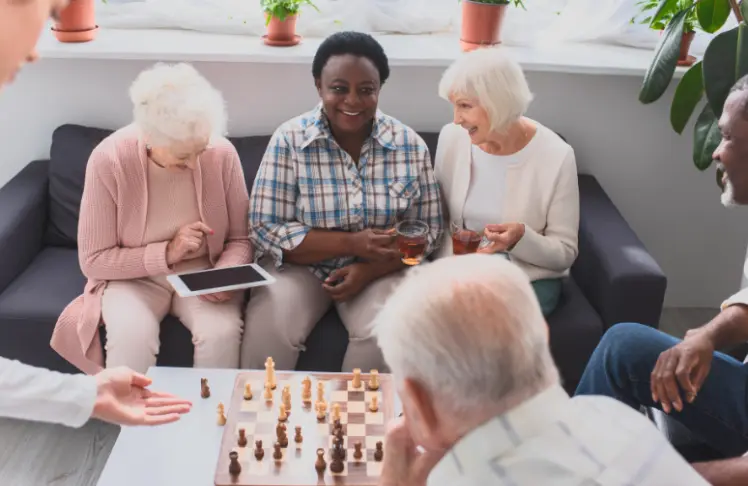Active Aging Presented by Public Health Seattle-King County
Just as physical exercise is good for your body, brain exercises are good for your mind — especially as you age. Research shows that engaging in memory and brain games may keep people “fresher and sharper for a longer period of time,” according to Neurologist and Director of Mayo Clinic’s Alzheimer’s Disease research, Dr. Ronald Petersen.
Memory is not the first cognitive skill to decline, said Sherry Willis, PhD, a developmental psychologist at the University of Washington, in an American Psychological Association interview. People in their 20s and 30s can experience slower mental processing speed.
Many brain game developers hope increased processing speed from playing the games will improve other cognitive functions.
Glenn Smith, PhD, a neuropsychologist at the Mayo Clinic and APA Committee on Aging member, conducted research showing that training people in one cognitive skill can benefit “other areas of cognition, such as memory and attention.”
While there is no evidence that playing mind games prevents dementia or Alzheimer’s, they do give your brain a workout. Seniors can play these 12 memory and brain games to exercise their minds.
Trivia Games
Trivia games test memory skills and can cover multiple subjects or a single topic. Examples include history, literature, TV shows, films, and general knowledge. Trivia is fun to play in teams and promotes social interaction as a “game night” activity.
Bingo
Bingo offers a fantastic “bingo night” senior social opportunity. Players use hearing, seeing, and cognitive skills as they listen to the caller, scan their card for a match, and recall “bingo” patterns for the win.
Word Search Puzzles
Word search puzzles are in magazines and online. A family member can even create a custom word find puzzle online with The Word Search using words that have special meaning in their family. Reading words on the list and finding them in the grid helps seniors recall special places, people, and moments in their lives.
Crossword Puzzles
A New England Journal of Medicine study found that participants with mild cognitive impairment who did web-based crossword puzzles showed cognitive improvement and less decline than participants who played online cognitive games.
Crossword puzzles engage multiple brain regions, activate the cortex, and strengthen the hippocampus (where memories are stored) by forming new brain connections to solve the puzzle, according to Harvard Health.
Sudoku
Sudoku is a popular game for seniors and has multiple benefits. It’s fun, exercises logic and reasoning skills, and provides a sense of accomplishment when the puzzle is complete. Like crosswords, sudoku puzzles are available in magazines and online.

Classic Card Games
From solitaire to gin rummy to poker and Go Fish, playing classic card games promotes social interaction and flexes multiple brain skills.
In Go Fish, for example, one player asks another if they have a certain card and lays down matches until their hand is empty. Like many other card games, Go Fish uses strategic thinking, memory skills, and counting.
Picnic Game
The “I went on a picnic, and I brought” game is a classic list-building game that exercises memory skills. The first player “brings something” that starts with the letter “a,” and the next player must repeat the letter “a” item (e.g., “apple”) and add a “b” word (e.g., “banana”). Players repeat and add items until someone forgets something and is out of the game.
Card Matching Memory Game
Though a kid’s game, it’s fun for all ages and exercises memory skills. Rows of cards are face down, and players turn over two cards at a time to look for a match. If they find one, they take the cards out of play. If not, they turn the cards back over, and another player tries. The game continues until players find all the matches.
Scrabble
Scrabble has entertained word-builders since 1938. Players try to gain as many points as possible by laying letter tiles on the board to form words and build off words other players create. It exercises logic, memory, reasoning, and mathematical skills.
Brain Yoga
Brain Yoga exercises the brain, motor skills, and hand-eye coordination. The participant makes a fist with their right hand, raises their right thumb, and holds the position. Next, they make a fist with their left hand, raise and hold their pinkie finger, then alternate hands and repeat.
Serving Tray Game
This game works short-term memory skills. Place items on a serving tray, let a player study them for a few minutes, then cover them up. Ask the player to write down or say everything that was on the tray.
Name Game
In this game, players name two objects for every letter in their first or last name and repeat, naming different items each time. For example, “Betty.” “B is for boat and ball.” “E is for eye and elephant.”
Playing memory and brain games like these is a fun way for seniors to exercise their brains, sharpen memory skills, and stay mentally active as they age.
Active Aging is presented by Public Health- Seattle & King County. Public Health- Seattle & King County recognizes the important and untold stories of innovation, service, and sacrifice by the Black community and supports efforts to improve equity and achieve social justice. We want everyone to get health insurance and access health care. Visitwww.kingcounty.gov/health for health insurance, flu and COVID-19 testing locations.
















